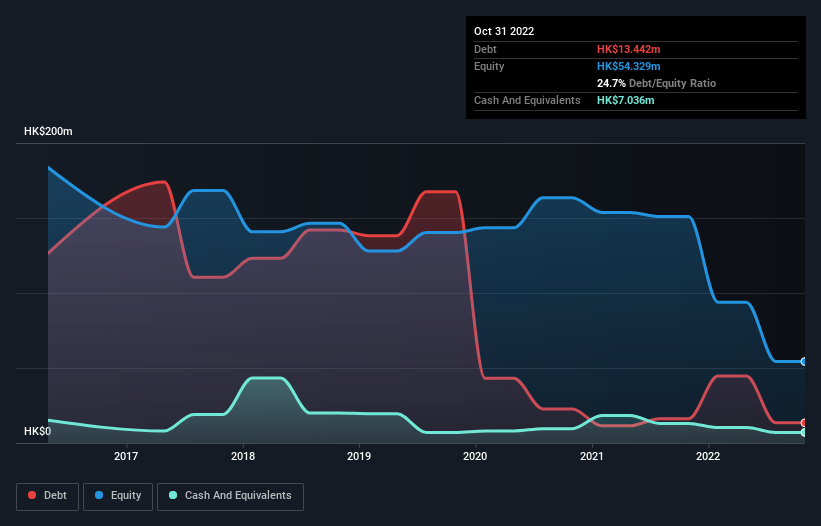
Some say volatility, rather than debt, is the best way to think about risk as an investor, but Warren Buffett famously said that 'Volatility is far from synonymous with risk.' So it might be obvious that you need to consider debt, when you think about how risky any given stock is, because too much debt can sink a company. We note that Kiddieland International Limited (HKG:3830) does have debt on its balance sheet. But is this debt a concern to shareholders?
Why Does Debt Bring Risk?
Generally speaking, debt only becomes a real problem when a company can't easily pay it off, either by raising capital or with its own cash flow. If things get really bad, the lenders can take control of the business. While that is not too common, we often do see indebted companies permanently diluting shareholders because lenders force them to raise capital at a distressed price. Of course, the upside of debt is that it often represents cheap capital, especially when it replaces dilution in a company with the ability to reinvest at high rates of return. When we think about a company's use of debt, we first look at cash and debt together.
Check out our latest analysis for Kiddieland International
What Is Kiddieland International's Debt?
You can click the graphic below for the historical numbers, but it shows that Kiddieland International had HK$13.4m of debt in October 2022, down from HK$16.2m, one year before. However, because it has a cash reserve of HK$7.04m, its net debt is less, at about HK$6.41m.

A Look At Kiddieland International's Liabilities
We can see from the most recent balance sheet that Kiddieland International had liabilities of HK$36.5m falling due within a year, and liabilities of HK$4.71m due beyond that. Offsetting this, it had HK$7.04m in cash and HK$29.9m in receivables that were due within 12 months. So its liabilities outweigh the sum of its cash and (near-term) receivables by HK$4.30m.
Given Kiddieland International has a market capitalization of HK$46.0m, it's hard to believe these liabilities pose much threat. Having said that, it's clear that we should continue to monitor its balance sheet, lest it change for the worse. There's no doubt that we learn most about debt from the balance sheet. But you can't view debt in total isolation; since Kiddieland International will need earnings to service that debt. So if you're keen to discover more about its earnings, it might be worth checking out this graph of its long term earnings trend.
In the last year Kiddieland International had a loss before interest and tax, and actually shrunk its revenue by 21%, to HK$197m. That makes us nervous, to say the least.
Caveat Emptor
Not only did Kiddieland International's revenue slip over the last twelve months, but it also produced negative earnings before interest and tax (EBIT). Its EBIT loss was a whopping HK$69m. Considering that alongside the liabilities mentioned above does not give us much confidence that company should be using so much debt. So we think its balance sheet is a little strained, though not beyond repair. For example, we would not want to see a repeat of last year's loss of HK$98m. In the meantime, we consider the stock very risky. When analysing debt levels, the balance sheet is the obvious place to start. However, not all investment risk resides within the balance sheet - far from it. For example, we've discovered 3 warning signs for Kiddieland International that you should be aware of before investing here.
If, after all that, you're more interested in a fast growing company with a rock-solid balance sheet, then check out our list of net cash growth stocks without delay.
Valuation is complex, but we're here to simplify it.
Discover if Kiddieland International might be undervalued or overvalued with our detailed analysis, featuring fair value estimates, potential risks, dividends, insider trades, and its financial condition.
Access Free AnalysisHave feedback on this article? Concerned about the content? Get in touch with us directly. Alternatively, email editorial-team (at) simplywallst.com.
This article by Simply Wall St is general in nature. We provide commentary based on historical data and analyst forecasts only using an unbiased methodology and our articles are not intended to be financial advice. It does not constitute a recommendation to buy or sell any stock, and does not take account of your objectives, or your financial situation. We aim to bring you long-term focused analysis driven by fundamental data. Note that our analysis may not factor in the latest price-sensitive company announcements or qualitative material. Simply Wall St has no position in any stocks mentioned.
About SEHK:3830
Kiddieland International
An investment holding company, manufactures and distributes plastic toy products and laboratory equipment in the United States, Europe, the Asia Pacific and Oceania, and the People's Republic of China.
Flawless balance sheet low.
Market Insights
Community Narratives



